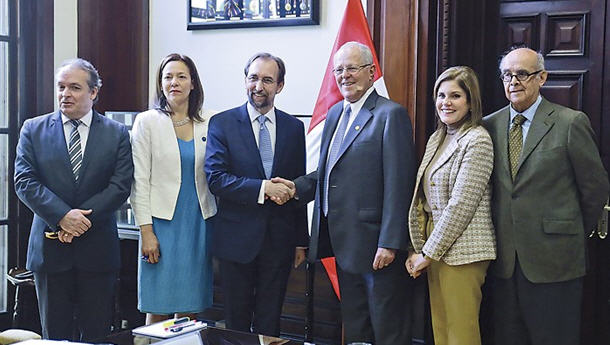
President Kuczynski emphasized the government’s commitment to promote and protect human rights in Peru and the region, in a palace meeting on Monday with the U.N. High Commissioner for Human Rights, Zeid Ra’ad Al Hussein.
Zeid is visiting Peru and Uruguay this week to discuss the progress and challenges in human rights issues in each country, and to launch an action plan jointly with the Inter-American Human Rights Commission to protect human rights defenders in the Americas.
Prior to meetings with the heads of the Congress and the Supreme Court, and with business leaders as well as civil and human rights organizations in Lima, Zeid joined cabinet chief Mercedes Araos in the Council of Ministers office to talk with the ministers and deputy ministers of Interior, Justice and Human Rights, Women and Vulnerable Peoples, Education, and Culture.
A career diplomat, Zeid was elected high commissioner for the Human Rights Council in 2014, the first Arab and Muslim to serve in the post. Educated at Johns Hopkins University and Christ’s College, Cambridge, Zeid served as Jordan’s ambassador to Washington 2007-2010.
But much of his career has been in the United Nations. He played a central role in establishing the International Criminal Court, and chaired the assembly for the ICR’s Rome Statute (2002-2005), which established four core international crimes — genocide, crimes against humanity, war crimes and the crime of aggression.
In 2004, he was advisor to the Secretary-General on Sexual Exploitation and Abuse in UN Peacekeeping. During the two years he was advisor he issued a ground-breaking report on eliminating such abuse from all peacekeeping operations, which became known as the Zeid Report. He also chaired the advisory council for the UN’s Development Fund for Women (UNIFEM) from 2004–2007.
Zeid is scheduled to travel to Montevideo on Oct. 25.





